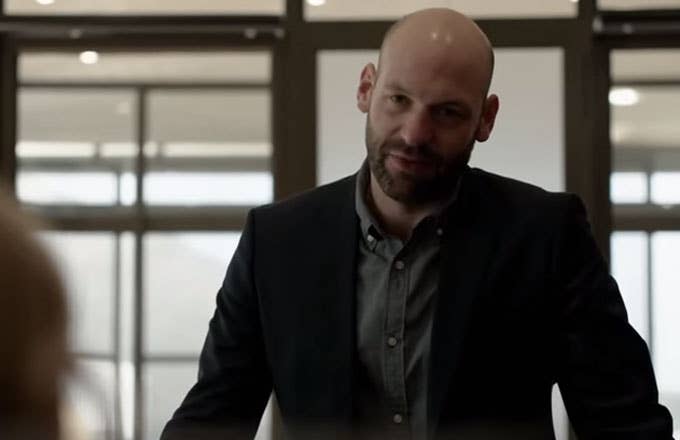
Season one of Homeland was one of the best spy cons ever pulled. We were tricked—by the riveting chemistry between Claire Danes and Damian Lewis as a brilliant, unstable CIA agent and POW maybe-terrorist, by the creeping sense of near-constant surveillance and permanent danger, and by the apparent complexity of the moral arguments the show was making about the cost of the War On Terror—into thinking Homeland had the potential to be an all-time great drama. We thougt it would be a series that would help define the Obama era and captivate viewers on a level with, say, Breaking Bad. Seasons two and three took their sweet time dismantling that illusion, throwing pacemaker bombs and endless silly romantic complications into the mix. Homeland isn’t a great show. But now that Brody’s death has mostly freed it from the specter of that first season, it’s content to be a pretty good one.
Relying on its preexisting cast of characters minus a few exceptions (I’ll miss you Dana Brody, even if no one else does), Homeland has picked itself up and moved its operations overseas, tackling the same subject matter but with an approach that’s much more hands-on and less near-chamber drama. (There are substantial parts of the three episodes Showtime sent to critics that take place stateside, but they still play as detours, away from the real action.) These are still, for the most part, people making decisions that get other people’s hands dirty—one such detached call gone wrong proves the inciting incident of the season—but they’re nearer to the field, and conduct operations in what they consider enemy territory (mostly in Pakistan).
The spark that ignites the events of the season comes from one of those operations, a snap decision with consequences that are possibly part of a bigger plot. The instigator of that operation, CIA station chief Sandy Bachman (a blessedly bald Corey Stoll), seems likely to be the central presence of the season. He takes up mental space even when he’s not in the room (and he’s not, much of the time). Without spoiling, Bachman’s approach to spy work is even more hardheaded than Carrie’s, and with no real outside antagonist yet, the suggestion of an internal investigation or fighting within the CIA is enough to be drive serious intrigue, maintaining some of the paranoia of season one. Because of his actions, the returning characters of Homeland are all, in their own way, called upon to deal with the repercussions.
1.

Instead of seeming cheap and convenient in a lets-get-the-gang-back-together way, the magnetic pull of the work at the show’s center gives the return of the rest of the cast a sense of tragic inevitability. Fara Sherazi (Nazanin Boniadi), introduced as a bright-eyed analyst last season, slips seamlessly into Carrie’s team. After a near-disastrous flirtation with the darker side of intelligence, Saul (the inimitable Mandy Patinkin) has returned to his former wise ways, though he’s now relegated to private security contracting after his CIA ouster. But his reintegration into the series makes sense, and blessedly, his desire to get back in the game gives us more reason to have F. Murray Abraham on our televisions as dire wolf Dar Adal.
But there's one place the reshuffling of the characters doesn’t work. One of the most-lauded elements of the first season of Homeland was its strenuous insistence on moral ambiguity, reading at times like a conscious pushback against Howard Gordon’s previous gig, 24. That complexity eroded as the series went on and found some convictions, most notably “drones are bad,” a position that seems likely to take center stage this season. (Without spoiling, the premiere is literally titled “The Drone Queen.”) Maybe half of Carrie’s conversations are thinly disguised policy arguments, but they’re especially heavy-handed when she butts heads with Peter Quinn, whose “human weapon with a conscience” shtick has started to wear a little thin no matter how hard Rupert Friend tries to sell it. In theory, Quinn’s moral compass is a fine way of demonstrating someone feeling conflicted about the work that gets done on Homeland, but that the show is newly structurally designed to focus almost entirely on espionage (again, so long Brody!) makes it nearly impossible for his story to acquire the momentum it needs to be effective.
That problem carries over to the new human face for the consequences of the CIA’s operations, Aayan Ibrahim, a medical student who survives an ill-advised bombing. He’s rather nakedly being set up as a representation of some sort of moral crisis, and Suraj Sharma only gets one real moment that suggests he can carry the role farther—not coincidentally, when Aayan looks up at CIA surveillance in anger (the best moments on this show are always mediated by a screen). Eventually, the suggestion that he might possess valuable intelligence raises the unfortunate specter of the Brody storyline, at least in part.
On the whole, Brody doesn’t hang particularly heavily over the beginning of the season. Their love affair and his death was an ordeal for Carrie and it scarred her, Homeland seems to suggest, but what hasn’t? It’s another in a long line of high-octane situations Carrie has been in, maybe one more intense than most, but still squarely in the place she lives all the time. The big exception to the Brody sidelining, of course, is Carrie’s child, the show’s functional symbol of its past who is very consciously left stateside. The idea of Carrie Matheson, Spy Mom was enough to give me hives (yet another woman on TV who could try and have it all). There’s something refreshing about the way Carrie makes very little effort to pretend she wants to be a mother. Her brief moments with her children serve as a nudge, a reminder that there’s something she’s never going to have—but we knew that already.
2.

These episodes are resetting the premise of the show, but they’re also reestablishing who Carrie Matheson is. Instead of the new characters (especially Martha Boyd, the ambassador to Pakistan ably played by Laila Robins) or the new plot, a significant chunk of the premiere is spent on Carrie’s quiet moments—eating, drinking, and especially downing her medication. These aren’t just showcases for the series’ direction (which remains snappy, lending a sense of foreboding to simple conversation), they give a sense of how short Carrie’s fuse has always been when she’s not putting together color-coded corkboards. If any of that material feels a little redundant, it’s reintroducing the version of the character that got lost in making puppy dog eyes at Brody. When Quinn tells Carrie, “You’re the hardest person in the world to say no to,” she smiles—she’s won.
Not many members of the cast are capable of balancing out Danes, who continues to dominate the show with her mesmerizing cockiness and vulnerability. (The late James Rebhorn, in particular, is missing as her father, who the show has merely kept away from Carrie rather than having him die off-screen; Amy Hargreaves is fine as her sister, but just fine.) So the best parts of the new season—the few scenes she gets with Saul—stick out even more. A look of pride Saul gives Carrie in episode three is easily the highlight of so far, playing on roughly the same nerve as Jesse and Walt teaming up in the later seasons of Breaking Bad.
And like Walt in Breaking Bad’s last season, by the time the season hits its stride, Carrie is in a position of authority over not only the people she’s worked with for a while and the rest of the characters the show has pulled in, but also a team of skeptics. She might clash with Boyd or one of Homeland’s real villains, CIA Director Lockhart (a still-sniveling Tracy Letts), but for the most part she’s the one calling the shots. That means she has a bit freer reign to be a badass, including one moment in episode three that reads as an explicit and triumphant rejection of the sexism that has dogged her career. But it also means she doesn’t have anyone to blame for failure but herself. Homeland can more fully explore the consequences of her actions, the thing it’s always done best.
How is she going to use that power? If the first few episodes are any indication, she’ll do anything to get her way, has a completely blinkered, myopic idea of the right thing, bullies everyone in her path—the same old Carrie, but on steroids. So the question for Homeland is back to being the same as it was in season one: Is Carrie the smartest woman in the room? As much as we might want to disagree, it looks like, stripped of at least one bag of tricks, the show might be finally ready to give a straightforward, thrilling answer: “Yes.”
Eric Thurm is a contributing writer. He tweets here.

